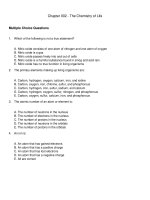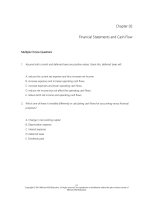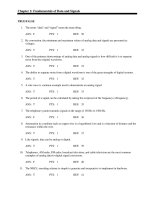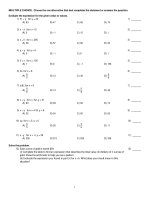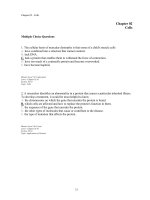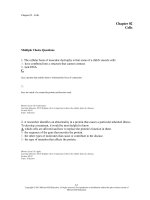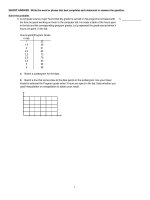Welding principles and applications 7th edition larry jeffus test bank
Bạn đang xem bản rút gọn của tài liệu. Xem và tải ngay bản đầy đủ của tài liệu tại đây (139.34 KB, 7 trang )
Chapter 2 Safety in Welding
TRUE/FALSE
1. Burns can be caused by ultraviolet light rays.
ANS: T
PTS: 1
REF: 24
2. To treat a third degree burn, apply ointments or antibiotic cream.
ANS: F
PTS: 1
REF: 25
3. Any cold liquid you drink can be poured on a first or second degree burn.
ANS: T
PTS: 1
REF: 25
4. Too much visible light can cause temporary night blindness.
ANS: T
PTS: 1
REF: 26
5. Both earmuffs and earplugs protect the outer ear from burns.
ANS: F
PTS: 1
REF: 28
6. Damage to your hearing caused by high sound levels is permanent and may not be detected until later
in life.
ANS: T
PTS: 1
REF: 28
7. Welding and cutting lead-bearing alloys or metals whose surfaces have been painted with lead-based
paint can generate lead oxide fumes.
ANS: T
PTS: 1
REF: 30
8. The welding area should be ventilated and forced ventilation is best, but natural ventilation is
sometimes required.
ANS: F
PTS: 1
REF: 31
9. Scrap metal and electrode stubs are difficult and costly to recycle.
ANS: F
PTS: 1
REF: 32
10. When using extension cords on portable power tools, the size of the conductors must be small enough
to enable a drop in voltage.
ANS: F
PTS: 1
MULTIPLE CHOICE
1. Burns ____.
a. are caused by heat and not light
REF: 42
b. are among the least common injuries in a welding shop
c. are divided into four categories
d. have a high risk of infection because of the dead tissue
ANS: D
PTS: 1
REF: 24
2. To treat a third degree burn ____.
a. apply ointments or antiseptic spray
b. remove all clothing stuck to the burn
c. cover the burned area with thick, sterile, non-fluffy dressings
d. pour iced water on the burn
ANS: C
PTS: 1
REF: 25
3. ____ light is dangerous because the welder cannot feel the light while being exposed to it, and it may
pass through clothing.
a. Ultraviolet
c. Visible
b. Infrared
d. Spectral
ANS: A
PTS: 1
REF: 26
4. ____ light can cause temporary night blindness.
a. Ultraviolet
c. Visible
b. Infrared
d. Spectral
ANS: C
PTS: 1
REF: 26
5. ____ light can cause burns, but a person will immediately feel this type of light.
a. Ultraviolet
c. Visible
b. Infrared
d. Spectral
ANS: B
PTS: 1
REF: 26
6. ____ respirators are air-purifying respirators that use a blower to force the ambient air through
air-purifying elements to the inlet covering.
a. Air-purifying
c. Powered air-purifying
b. Atmosphere-supplying
d. Supplied-air
ANS: C
PTS: 1
REF: 30
7. The symptoms of lead poisoning include ____.
a. influenza symptoms
b. lung irritation and kidney damage
c. abdominal cramps and lung irritation
d. metallic taste, loss of appetite, nausea, abdominal cramps, and insomnia
ANS: D
PTS: 1
REF: 30
8. The symptom of acute exposure to high concentrations of cadmium fumes is ____.
a. loss of appetite
c. abdominal cramps
b. lung irritation
d. insomnia
ANS: B
PTS: 1
REF: 30
9. The symptoms of exposure to zinc oxide fumes include ____.
a. influenza symptoms
b. lung irritation and kidney damage
c. abdominal cramps and lung irritation
d. metallic taste, loss of appetite, nausea, abdominal cramps, and insomnia
ANS: A
PTS: 1
REF: 30
10. ____ is a gas that is produced by the ultraviolet radiation in the air in the vicinity of welding
operations.
a. Argon
c. Ozone
b. Phosgene
d. Carbon dioxide
ANS: C
PTS: 1
REF: 31
11. ____ is formed when ultraviolet radiation decomposes chlorinated hydrocarbon.
a. Argon
c. Ozone
b. Phosgene
d. Carbon dioxide
ANS: B
PTS: 1
REF: 31
12. Any system of ventilation should draw the fumes or smoke away before it rises past the level of the
welder’s ____.
a. shin
c. chest
b. hip
d. face
ANS: D
PTS: 1
13. General work clothing should ____.
a. be made of a synthetic fabric
b. be loosely woven, and a light color
ANS: C
PTS: 1
REF: 31
c. be tightly woven and a dark color
d. have deep pockets
REF: 32
14. The best material to use for special protective clothing is ____.
a. polyester
c. 100% wool
b. 100% cotton
d. leather
ANS: D
PTS: 1
REF: 33
15. Stored oxygen and fuel gas cylinders ____.
a. can be stored separately or together
b. must be separated by 20 feet
c. must be separated by a 20 ft. high wall
d. must be separated by 5 feet
ANS: B
PTS: 1
REF: 34
16. Acetylene cylinders that have been lying on their sides must stand upright for at least ____ hours
before they are used.
a. two
c. four
b. three
d. five
ANS: C
PTS: 1
REF: 35
17. ____ fire extinguishers are used for combustible solids.
a. Type A
c. Type C
b. Type B
d. Type D
ANS: A
PTS: 1
REF: 36
18. ____ fire extinguishers are used for electrical fires.
a. Type A
c. Type C
b. Type B
d. Type D
ANS: C
PTS: 1
REF: 36
19. A ____ is the symbol for a Type C fire extinguisher.
a. green triangle
c. blue circle
b. red square
d. yellow star
ANS: C
PTS: 1
REF: 36
20. ____ fire extinguishers are used for combustible metals such as zinc and magnesium.
a. Type A
c. Type C
b. Type B
d. Type D
ANS: D
PTS: 1
REF: 37
21. If a nut or bolt is too tight to loosen with a wrench, ____.
a. use a cheater bar
c. use a smaller wrench
b. use a longer wrench
d. cut the nut or bolt off
ANS: B
PTS: 1
REF: 38
22. Welding cable must be spliced ____ the electrode holder.
a. within 10 feet of
c. within 20 feet of
b. more than 10 feet away from
d. more than 20 feet away from
ANS: B
PTS: 1
REF: 40
23. To test a grinding stone for cracks ____.
a. tap the stone in four places and listen for a ring
b. visually inspect the stone
c. shine a light under the stone
d. wet the stone and look for bubbles
ANS: A
PTS: 1
REF: 44
24. ____ are usually either hydraulic or flywheel operated.
a. Cut-off machines
c. Power punches
b. Shears
d. Band saws
ANS: C
PTS: 1
REF: 46
25. The base of a ladder should be set out a distance equal to ____ the height to the point of support.
a. one-fourth of
c. one and a half times
b. half of
d. twice
ANS: A
PTS: 1
REF: 48
COMPLETION
1. _____________________ respirators are atmosphere-supplying respirators that admit breathing air to
the facepiece only when a negative pressure is created inside the facepiece by inhalation.
ANS: Demand
PTS: 1
REF: 29
2. Most paints containing ____________________ have been removed from the market; however, some
industries, such as marine or ship applications, still use them.
ANS: lead
PTS: 1
REF: 30
3. ____________________ is a metal used in large quantities in the manufacture of brass and is found in
brazing rods.
ANS: Zinc
PTS: 1
REF: 30
4. Acetylene is absorbed in ____________________.
ANS: acetone
PTS: 1
REF: 35
5. Highly combustible materials should be ____________________ feet or more away from any welding.
ANS:
35
thirty-five
thirty five
PTS: 1
REF: 35-36
6. Green hoses are to be used only for ____________________.
ANS: oxygen
PTS: 1
REF: 38
7. Electrical ____________________ is lowered in the presence of water or moisture, so welders must
take special precautions when working under damp or wet conditions.
ANS: resistance
PTS: 1
REF: 40
8. Amps is the abbreviation for amperes, which is a measure of electric ____________________.
ANS: current
PTS: 1
REF: 42
9. A(n) ____________________ will prevent an accidental separation of a tool cord from an extension
cord during operation.
ANS:
knot
cord connector
PTS: 1
REF: 43
10. When a grinding stone wears down, keep the tool rest adjusted to within ____________________ of
an inch.
ANS:
1/16
one-sixteenth
one sixteenth
PTS: 1
REF: 44
SHORT ANSWER
1. What is an MSDS?
ANS:
All manufacturers of potentially hazardous materials must provide to the users of their products
detailed information regarding possible hazards resulting from the use of their products. These
material safety data sheets are often called MSDSs. They must be provided to anyone using the
product or anyone working in the area where the products are in use. Often companies will post these
sheets on a bulletin board or put them in a convenient place near the work area. Some states have
right-to-know laws that require specific training of all employees who handle or work in areas with
hazardous materials.
PTS: 1
REF: 32
2. How does a fire extinguisher work, and how should it be used?
ANS:
A fire extinguisher works by breaking the fire triangle of heat, fuel, and oxygen. Most extinguishers
both cool the fire and remove the oxygen. They use a variety of materials to extinguish the fire. The
majority of fire extinguishers found in welding shops use foam, carbon dioxide, a pump tank, or dry
chemicals. When using a foam extinguisher, do not spray the stream directly into the burning liquid.
Allow the foam to fall lightly on the base of the fire. When using a carbon dioxide extinguisher, direct
the discharge as close to the fire as possible, first at the edge of the flames and gradually to the center.
When using a dry chemical extinguisher, direct the extinguisher at the base of the flames. In the case
of type A fires, follow up by directing the dry chemicals at the remaining material still burning. The
extinguisher must be directed at the base of the fire where the fuel is located.
PTS: 1
REF: 37
3. What is the difference between a tool with external grounding and a double-insulated tool?
ANS:
A tool with external grounding has a wire that runs from the housing through the power cord to a third
prong on the power plug. When this third prong is connected to a grounded, three-hole electrical
outlet, the grounding wire will carry any current that leaks past the electrical insulation of the tool
away from the user and into the ground. In most electrical systems, the three-prong plug fits into a
three prong, grounded receptacle. The green (or green and yellow) conductor in the tool cord is the
grounding wire. Never connect the grounding wire to a power terminal. A double-insulated tool has an
extra layer of electrical insulation that eliminates the need for a three-prong plug and grounded outlet.
Double-insulated tools do not require grounding and, therefore, have a two-prong plug. In addition,
double-insulated tools are always labeled as such on their nameplate or case.
PTS: 1
REF: 40
4. Describe how to test a grinding stone for cracks.
ANS:
Before a grinding stone is put on the machine, it should be tested for cracks. This is done by tapping
the stone in four places and listening for a sharp ring, which indicates it is good. A dull sound indicates
that the grinding stone is cracked and should not be used.
PTS: 1
REF: 44
5. Summarize the use of shears.
ANS:
Shears work like powerful scissors. The correct placement of the metal being cut is as close to the
pivot pin as possible. The metal being sheared must be securely held in place by the clamp on the
shear before it is cut. If you are cutting a long piece of metal that is not being supported by the shear
table, then portable supports must be used. As the metal is being cut it may suddenly move or bounce
around; if you are holding on to it, this can cause a serious injury.
PTS: 1
REF: 45-46
